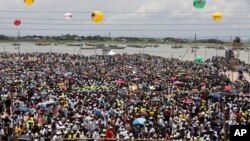Police in Bangladesh have arrested two men over their social media posts criticizing a new multibillion dollar bridge that has been trumpeted by the government as “a symbol of pride” and its greatest feat.
The Padma multipurpose bridge — Bangladesh’s longest bridge — was inaugurated Saturday by Prime Minister Sheikh Hasina after eight years of construction plagued by delays, political conflict, high costs and allegations of graft.
The 6.15-kilometer bridge, which cost a whopping $3.87 billion, is billed by Hasina’s government as the jewel in its crown, and the fanfare over its completion has been matched only by the harsh response to any criticism of it.
Police arrested one person Monday from the coastal district of Noakhali in southern Bangladesh for uploading a derogatory post about the Padma Bridge on his Facebook page.
Abul Kalam Azad, 42, a former low-level leader of the country’s main opposition Bangladesh Nationalist Party (BNP), said in a post that he would like to take a photograph of himself urinating on the bridge.
Azad’s post angered a lot of people in his native Companiganj town and was removed. Azad vehemently denied posting the remark, however, and insisted that his Facebook ID had been hacked.
Rashidul Islam, a police officer in Companiganj, told VOA that Azad was sent to jail by the district’s chief judicial magistrate on Tuesday morning.
Controversy over TikTok videos
Mohammad Bayezid Talha, 31, was arrested Sunday because of a viral TikTok video in which he showed he was able to unscrew nuts and bolts from the bridge with his bare hands.
This is the Padma Bridge made of billions [of Bangladeshi taka],” Talha said on the video as he unscrewed the nuts. “Its unhinged screws are in my hands now.”
After Talha’s arrest, the Criminal Investigation Department (CID) of Bangladesh’s police said Talha had used tools to unscrew the bolts and insisted it could not be done with bare hands.
“He intentionally did that to denigrate the construction standard of the bridge,” the CID said at a press conference.
Talha was booked under the Special Powers Act, which criminalizes sabotaging or damaging government undertakings, and has previously been used to curb press freedom. Penalties under the act can range up to the death penalty. He was remanded for seven days.
Police are still seeking another unidentified individual who also was seen in a viral video unscrewing nuts with his bare hands.
RTV — a local Bangladeshi channel — aired interviews with construction workers who said they had been sent to tighten some nuts on the bridge that were not properly secured.
The RTV report created an uproar in social media, with many people charging that Talha had been arrested for exposing a “weakness of the bridge” and questioning the CID’s claim that the nuts couldn’t be unscrewed without tools.
Talking with VOA, Ratul Mohammad, the spokesperson of People’s Activist Coalition (PAC) —a Bangladeshi political organization that promotes human rights — said the arrests went against the spirit of “people’s freedom of speech.”
“By doing so, the government only curbs people’s democratic right,” Mohammad said.
Asif Nazrul, professor of law of Dhaka Universit,y told VOA that what Talha did could have motivated others to do the same, causing serious damage to the bridge. “But booking him under Special Powers Act — the highest punitive measure, which is capital punishment — is way too much,” Nazrul said.
High Court ruling
Bangladesh’s High Court, meanwhile, ordered the government on Tuesday to form a commission within 30 days to identify people who have made up false stories about corruption involving the Padma Bridge project.
A day earlier, the court said those who have criticized the bridge construction are “enemies of the country” and “must be identified.”
“If there was no conspiracy, then why did the World Bank suspend its funding?” the court asked rhetorically. The World Bank and other donors withdrew financing for the project after allegations of corruption were brought against senior government officials and ministers a decade ago.
Canadian engineering firm SNC-Lavalin was accused of bribing top Bangladeshi officials overseeing the project and was banned from bidding on World Bank projects for a decade. Prosecutors in Canada eventually declined to pursue graft charges against company executives after a court ruled some wiretap evidence against them was inadmissible.
Bangladesh’s Anti-Corruption Commission also investigated the matter but found no clear evidence for the allegation.
“Constructing Padma Bridge is a massive achievement and success of the Hasina administration but what they are doing surrounding it is ignominious,” law professor Nazrul said.
“At the end of the day, it is just a structure — a mega one. But it’s nothing sacred,” he said, adding that criticizing it is not blasphemy.
Bangladesh Jails Critics of Landmark Bridge Project




